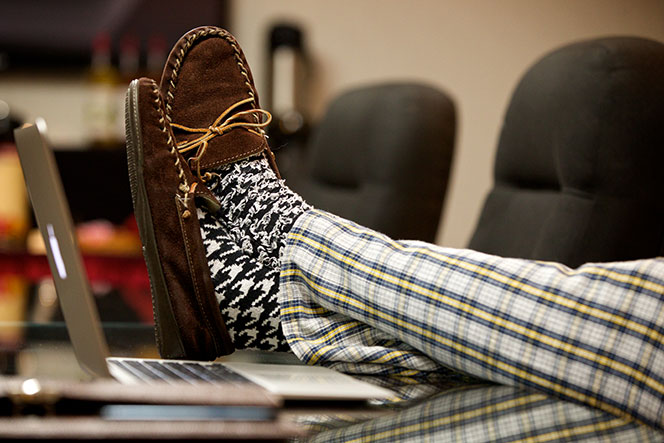There were many days during undergrad where I simply didn’t feel like getting dressed in the morning. Donning pajama bottoms, flip-flops, and a T-shirt, I would confidently set off across campus and arrive at class with seconds to spare. I saw myself as just another dude in “lounge” clothes – no big deal. While I outgrew this particular habit as an adult – I still frequently leave the house wearing clothes that might be considered sub-par in the fashion world – or by anyone’s standards for that matter. In fact, I honestly can’t remember the last time that I spent more than 60 seconds choosing an outfit. While I might attribute this to laziness or indifference, my lack of style conveys a very different message to the world than I (consciously) intend. My unkempt hair, tennis shoes with holes, stained cargo shorts, or wrinkled T-shirt, do not simply convey my nonchalance about my appearance – they also convey my privilege. The ability to dress however the hell I want is one of the many unmerited luxuries of being a middle-class White man in America.
If the world we live in values looks, why do I often choose to boldly go out in public wearing clothes that do not enhance my appearance? The answer is simple – because I can get away with it. In fact, my decision about what I wear and what that says about me, is very different than what the exact same outfit would convey about someone from almost any other race or gender. This is a privilege because while it may be a choice for me – this is not a choice that most People of Color or women can afford to make if they want to be successful in “our” society.
As a White male, I am part of the social group that gets to make decisions not only about how I dress, but also how we expect others to “dress for success.” Formal attire; corporate attire; business attire – these are the coded terms set by White men about how one should dress in order to convey a sense of power. A suit, tie, polished dress shoes, and an expensive watch indicates the top tier for White men, while a form-fitting dress, perfect make-up and hair, manicured nails, painful high heels, and a skinny body are the (unfair) qualifiers of a successful woman in America.
Yet, despite these pre-determined norms of successful attire, most places I go, I am not expected to wear those clothes as long as I can convey the sense that I am capable of choosing to do so when I want to – that I “clean up nicely.” In other words, if I choose to wear pajama pants into a coffee shop, or even to work – I am not sending a signal that I can’t afford better clothes. In fact, I am likely conveying the exact opposite message. By choosing to wear pajama bottoms in public, I am (unknowingly) telling the world that I don’t have to care about my appearance in order for me to be (perceived as) successful. I am also telling the world that I likely have better clothes at home – yet I can choose not to wear them because I know it will not impact my perceived status or wealth. Moreover, I am communicating that despite the fact that my group sets the standards of “successful attire,” I often don’t have to abide by those norms because others will likely still see me as a person with power.
In contrast, when most women or People of Color choose to wear pajama pants or tattered clothes in public – our society will likely judge not only their appearance, but also them as a person. We will likely assume that they cannot afford better clothes, or that they were too lazy to get dressed. We may question their status as well as their competence. Unlike for a White man, a woman or Person of Color choosing to wear pajama pants in public does not give any indication that they may simply be choosing not to display/promote their status, or potential wealth. On the contrary, it will most likely convey just the opposite – making them a target of judgment, ridicule, and condemnation.
The simple counter-argument is that I would still not be allowed into a formal event or get hired for a job wearing pajama pants. While that may be true for me personally, plenty of other White men have enough status and power to get into whatever event they want, wearing whatever they want. Regardless of the fact that this particular level of privilege may not extend to me, my position of power still stands because I am able to make a conscious choice to rebel against standards that my group is responsible for creating and upholding.
What does this all mean? Should I start dressing better and never wear frumpy clothes or pajamas in public again? Not necessarily – although my wife may disagree. Ultimately, this is not about the clothes that I choose to wear – nor is it even about my appearance. This is about becoming more aware of one my many luxuries that that most simply cannot afford; and that is a privilege not to be taken lightly. I need to recognize and own the fact that I live in a world where I get to do things that other people can’t – a world that was designed for White men, by White men, in which we get to determine the standards of appearing successful.
david
Related Posts
- 1 year ago
- 1 year ago
- 1 year ago
- 2 years ago




